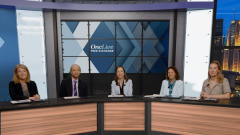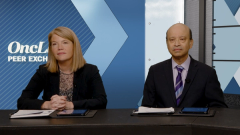
Typical Approaches for Treatment Selection in the Third Line and Beyond
Experts share their go-to regimens in the third-line and higher setting of HER2+ metastatic breast cancer, and touch on the factors that support their decision-making.
Episodes in this series

Transcript:
Debu Tripathy, MD: I’m just going to take a poll before we go on to some cases here. If a patient has had THP [docetaxel, trastuzumab, pertuzumab] and has had T-DXd [trastuzumab deruxtecan], what’s your go-to third-line regimen? I’ll start with you, Heather.
Heather McArthur, MD: I’m not sure there’s a really established third line go-to. Of course, clinical trial enrollment, if there are studies available, is always a priority to further push innovation in that space. I would probably consider the HER2CLIMB regimen at that stage [because] the data are so incredibly promising. But there are so many other options too. So, it would be patient specific. I always wonder whether I should save these regimens until patients develop brain metastasis. I struggle with whether I should be doing screening brain MRIs in patients because historically I’ve always waited until they develop symptoms before doing brain imaging, but now that we have all of these options that have CNS [central nervous system] activity, I wonder whether I should be doing imaging earlier. I’m not sure that I have an established standard practice in this space at all. I think we’re all learning together as these new data and real-world data unfold.
Sara Hurvitz, MD: Absolutely. Virginia?
Virginia G. Kaklamani, MD, DSc: Speaking of real-world data, one of the things we haven’t [known] up until now is does tucatinib work after T-DXd? There was a French database lookup that was presented at ASCO [American Society of Clinical Oncology annual meeting], looking at 101 patients. The response rate was at 30%, which is not bad. Median PFS [progression-free survival] was 4.7 months. We’ve seen better, but at least it seems like it is an active combination. So, that’s what I typically do. For some reason I try to space out the ADCs [antibody-drug conjugates], so I wouldn’t use one ADC after the other. But we still don’t have any data on whether T-DM1 [trastuzumab emtansine] is active after T-DXd. Hopefully, that’ll be collected [soon].
Sara Hurvitz, MD: Absolutely. Great points. Debu?
Debu Tripathy, MD: I also probably use HER2CLIMB as my more common regimen, but it does have to be individualized. I go over my patients’ toxicities they may have experienced before, their personal preferences. I think diarrhea is a huge issue. Some patients have tolerated TKIs [tyrosine kinase inhibitors] better than others. If they’ve been on one before, I will use it, or I might at least try HER2CLIMB and then try something else. T-DM1, I haven’t used it that much, I must say, but I think I should give it more of a try until we have data. That’s one of the unmet needs, we really need post–T-DXd data. If we pool institutions together, we probably can get it. I do think that margetuximab is an interesting drug. It allows you to combine it with one of several different chemotherapies that a patient may not have seen before because we always forget about the cytotoxic partner. Drugs like vinorelbine have a track record of having activity with trastuzumab, so I have used that on a couple of occasions.
Sara Hurvitz, MD: And Melinda?
Melinda L. Telli, MD: I would favor the HER2CLIMB regimen in the third line. I do think T-DM1 is a very reasonable option in that line, and that’s the big decision for me, T-DM1 vs HER2CLIMB. And it’s about patient preference. I think some patients like the idea of an oral therapy. Again, toxicities, all of these are factors that weigh into the ultimate decision.
Sara Hurvitz, MD: Clearly it’s becoming the art of medicine in the third line and beyond, with us relying a lot on ongoing studies as well as real-world data to help inform our practice. This was an awesome discussion.
Transcript edited for clarity.








































